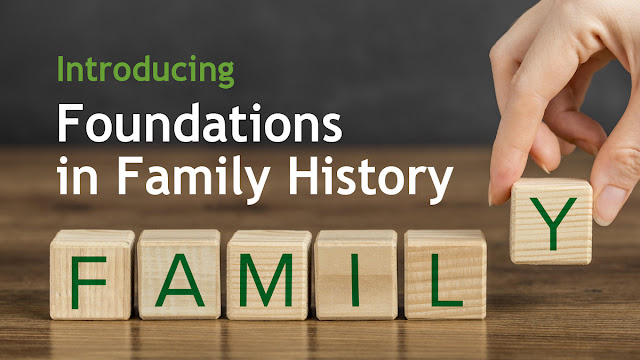Did you know that libraries and archives see a surge of interest in family history in the weeks and months following the holidays? I get it. I feel very nostalgic as the old year comes to a close. There is a strong pull to look to the past and see how we all got to 2025. Maybe it’s America’s 250th looming, but I’m extra fired up this year.
As genealogists, our learning curve is long and it should never end. We’re constantly learning about the places and times in which our family lived, and we also rely on new genealogical tools and record collections that may be more accessible than before. These tools and the way we access records are constantly evolving. How do we stay abreast of these developments to keep our family history moving in the right direction?
Fortunately, there is no better time to be a genealogist. Educational tools abound and can give our research just the jumpstart it needs.
Read, Read, Read
For a fun and educational read over the holidays, I grabbed a book about the Gilded Age in New York City. Although my ancestors weren’t the subject of the book, I learned more about the city as it grew from its early beginnings at the foot of Manhattan through its rapid expansion northward during the 1800s. Like the book's subject, my ancestors made some money in the mid-1800s by dabbling in real estate, buying property in upper Manhattan, and profiting from reselling that land as development moved north. Learning more about the historical context places our ancestors in the landscape of history and clues us into new avenues of research.
Genealogical and historical periodicals can also shed light on history and introduce us to unfamiliar record types. Join local historical societies to learn the history of the areas where your research has taken you. Genealogical societies are home to experts, whether nationally like the National Genealogical Society (NGS), or locally for their particular location (and beyond). Ethnocentric societies can lend a hand in investigating ancestors with unique research challenges based on their origins and customs.
National and regional publications can clue you into the latest methods and tools to take your family history to new depths.
This month’s NGS Magazine does a deep dive into one of Louisville’s finest genealogical resources, the Filson Historical Society, as well as the Draper Manuscripts, a rich collection of manuscripts and records, largely related to the Revolutionary War and the War of 1812, in what Draper called the “Trans-Allegheny West,” which includes portions of the Carolinas, Virginia, the Ohio River Valley, the Mississippi River valley, Georgia, and Alabama. Other samplings from the magazine cover US tax law (by Judy Russell, JD, CG, CGL) and Irish Valuation Office records (by Fiona Fitzsimons).
The latest National Genealogical Society Quarterly (NGSQ) for December 2024, includes in-depth case studies that cover the use of indirect evidence, Y- and autosomal-DNA evidence, researching same-surname spouses, and the importance of researching your ancestor’s entire network, among many other helpful approaches to challenges that will have you inspired and researching more efficiently.
And whatever you do, don’t overlook the footnotes in the NGSQ and similar scholarly periodicals. They deserve a read of their own. Here you can find family history gold. Unique collections that have been accessed for the research are brought to light, and you may find that records you may not have had access to in the past are now available in some new way.
And if that’s not enough reading for you in these dark winter months, check out the book reviews. Titles reviewed in this past issue include, The Fabric of Civil War Society: Uniforms, (by Shae Smith Cox), Navigating Liberty: Black Antislavery Reformers in the Civil War South (by John Cimprich), and Genealogical Document Organizing: Paper Files to Computer Files (by William Dollarhide), among other notable titles.
Hone Your Craft
No matter how far along you are in your research, continuing education is a part of life, and nothing beats one-on-one interaction, via an in-person or online event.
RootsTech, held in Salt Lake City will run from 6-8 March 2025, and we’re all prepping for the 2025 NGS Annual Conference in Louisville, Kentucky, 23-26 May 2025.
ConferenceKeeper.org is your guide to what opportunities are available to you with a calendar of events that can be searched by keyword or date. Larger conferences are included, as well as smaller events at local libraries and societies. I looked around for about five minutes and found several local events and a lot of virtual events where I can learn from home, all cozy and warm in my jammies and slippers.
ConferenceKeeper also has a list of dozens of genealogy-related podcasts you can listen to at your leisure. Great for when you are waiting somewhere or doing household chores, or even during those middle of the night wake ups. (Just be aware last time I did this, I found myself online looking something up at 3:00 a.m. because it just couldn’t wait until morning.)
NGS also offers a selection of cloud-based courses that allow you to learn at your own pace. You can save $75 through 17 January 2025 on the most popular course, Foundations in Family History, when you purchase the bundle of all three modules with the discount code DISCOVER75.
However you jumpstart your research this season, we wish you great success in 2025. Share your favorite tricks with us on our Facebook page. We’d love to learn your favorite ways to give your research a boost.









